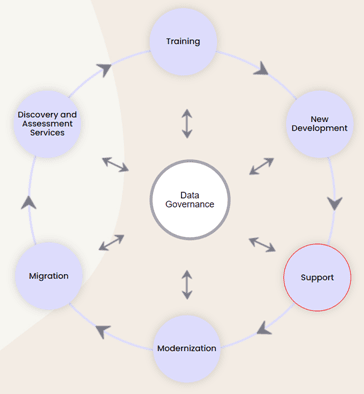Our Data Governance Practice
Our Data Governance (DG) Practice was inspired by the thousands of customers we’ve helped over the decades with their Microsoft Access database applications technical needs.
After ensuring legacy system support and stabilization, our customers are freed up to focus on the outputs of these systems and often discover that their data integrity is not what is should be. This is why we have developed this practice to continuously improve their data quality.
Help4Access starts the DG practice, often called Information Governance (IG), and works with the business stakeholders to develop an in-house capability, after which time we turn the developed practice over to our customer’s internal team.
We use a three-stage plan. Contact Us to learn more.
What is Data Governance and Why Do You Need It?
Data governance is a requirement in today’s fast-moving and highly competitive enterprise environment. Now that organizations have the opportunity to capture massive amounts of diverse internal and external data, they need a discipline to maximize their value, manage risks, and reduce cost.
What is Data Governance?
Data governance is a collection of processes, roles, policies, standards, and metrics that ensure the effective and efficient use of information in enabling an organization to achieve its goals. It establishes the processes and responsibilities that ensure the quality and security of the data used across a business or organization. Data governance defines who can take what action, upon what data, in what situations, using what methods.
A well-crafted data governance strategy is fundamental for any organization that works with big data, and will explain how your business benefits from consistent, common processes and responsibilities. Business drivers highlight what data needs to be carefully controlled in your data governance strategy and the benefits expected from this effort. This strategy will be the basis of your data governance framework.
For example, if a business driver for your data governance strategy is to ensure the privacy of healthcare-related data, patient data will need to be managed securely as it flows through your business. Retention requirements (e.g., history of who changed what information and when) will be defined to ensure compliance with relevant government requirements, such as the GDPR.
Data governance ensures that roles related to data are clearly defined, and that responsibility and accountability are agreed upon across the enterprise. A well-planned data governance framework covers strategic, tactical, and operational roles and responsibilities.
Benefits of Data Governance
An effective data governance strategy provides many benefits to an organization, including:
- A common understanding of data — Data governance provides a consistent view of, and common terminology for, data, while individual business units retain appropriate flexibility.
- Improved quality of data — Data governance creates a plan that ensures data accuracy, completeness, and consistency.
- Data map — Data governance provides an advanced ability to understand the location of all data related to key entities. Like a GPS that can represent a physical landscape and help people find their way in unknown landscapes, data governance makes data assets useable and easier to connect with business outcomes.
- A 360-degree view of each customer and other business entities — Data governance establishes a framework so an organization can agree on “a single version of the truth” for critical business entities and create an appropriate level of consistency across entities and business activities.
- Consistent compliance — Data governance provides a platform for meeting the demands of government regulations, such as the EU General Data Protection Regulation (GDPR), the US HIPAA (Health Insurance Portability and Accountability Act), and industry requirements such as PCI DSS (Payment Card Industry Data Security Standards).
Data Governance Is Not Optional
Organizations today have incredible amounts of data about customers, clients, suppliers, patients, employees, and more. When this information is properly used to better understand the market and your target audience, your organization will be more successful. The same data governance will also ensure this data is trusted, well-documented, and easy to find and access within your organization, and that it is kept secure, compliant, and confidential.
Make certain that your organization is positioned to maximize data governance investments and minimize risk of data breaches.
Contact us to learn more.



